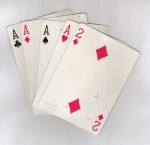(Prologue: I’ve got first-hand experience that a real understanding of the laws of karma can substantially change our lives for the better. I created this weblog to share information and personal experience with others. May it be of benefit!)
If I make certain decisions, I will get certain outcomes. That is the law of karma — the basic flow of nature. <source: Sakyong Mipham Rinpoche – The Four Sessions of Basic Goodness and here.>
In the post of March 28, 2010 we heard the story of Sariputra, the monk, who roared with laughter. We saw that once the consequences from our past volitional actions ripen,
we cannot change them. So it would be a good idea to get familiar with the
10 non virtuous actions and the karma accumulated from having engaged in them — especially as one of those non virtuous actions is not understanding how karma works! Yikes!
As Chogyam Trungpa Rinpoche puts it, karma is tit for tat. <source: description of One of the Four Reminders: Karma, its cause and effect. For full quote, please click
here.>
Here is the chart of the 10 negative consequences that arise from ten past volitional actions. The one thing they all have in common is that they spring from self-absorption <source: teacher Jay Lippman, Talk 5 of weekend seminar in Toronto, Canada on Karma, March 13-14, 2010, Toronto, Canada>:
| RESULTS OF PAST NON VIRTUOUS ACTIONS |
||
| ACT IN PAST |
RESULT IN PRESENT |
ENVIRONMENT |
| Killing | Short life | Little vitality |
| Stealing | Poverty | Meager harvests; hurricanes etc |
| Sexual misconduct | Unfaithful spouse | Unclean |
| Lying | Slandered – heap blame on you; deceived | Bad odor |
| Divisive talk | Arguments; fighting; friends untrustworthy | Difficult place |
| Malicious talk | Criticized | Difficult place |
| Empty talk | People won’t listen to you; lack self confidence | Barren place |
| Greedy thoughts | Great attachments; never feel satisfied | Worse conditions |
| Malice | Great aggression; avoid what is beneficial | Wars, diseases, etc. |
| Wrong view (i.e. don’t understand how karma works) | Stupidity | No help; best sources of health dry up for you; everything you do turns to dust |
In a future post, I will demonstrate the information in the chart by using real examples from real lives.
If you found this post helpful, please share it with a friend. Then consider subscribing to this weblog by clicking on the Subscribe button in the navigation bar. Follow one of the three sets of step-by-step directions. Thank you.










